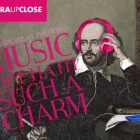Music Oft Hath Such a Charm. 2016OperaUpClose
Read more about the opera Music Oft Hath Such a Charm
After the successful performance of Carmen the evening before, the omens must have seemed good for this second evening by OperaUpClose - an entertainment woven together using various songs and arias derived from works based on Shakespeare. In a location like St Andrews this ought to have been a popular attraction. However, by comparison with the previous evening, there was a poor attendance. There had been rain earlier in the day, but the evening was fair, and the performance took place in a waterproof setting - under a broad transparent canopy.
In any event, the small group who attended clearly enjoyed an excellent evening, and the Byre in the Botanics team will presumably just put it down to 'first year blues', and the unfamiliarity of the idea and persevere with plans for next year. Certainly it is to be hoped that a return visit by this company will be arranged. The programme was devised to an English libretto by Ashley Pearson and directed with a refreshing lightness of touch by Valentina Ceschi. Costumes were appropriate to a warm summer's day and the props were minimal.
The outline of events in this entertainment was clear. It's the morning after a party (several left-over bottles) and Benedict has made a conquest. Sylvia has given him her number, and he discusses her with his old sparring partner Beatrice - appropriately by means of 'Who is Sylvia?', Schubert's setting of lines from Two Gentlemen of Verona, here adjusted into a duet. Sylvia herself then comes on for her first solo. In happy mood, her vehicle is Juliet's famous Waltz Song from Gounod's Roméo et Juliette. She is then accosted by Benedick, to the beautiful strains of the first Nannetta/Fenton encounter from Verdi's Falstaff.
An element of confusion follows - Demetrius actually loves Sylvia and Beatrice seems surprised at how upset she is at Benedict's action - a queue for the forest ensemble 'Stay, though thou kill me, sweet' from Britten's adaptation of A Midsummer Night's Dream. Beatrice, left alone, reflects on her unhappiness, her vehicle being Romeo's lovely 'Deh tu bell'anima' from Bellini's I Capuleti. The first half ended with Demetrius in a jealous rage at his betrayal by Sylvia - cue for a rousing rendition of Ford's monologue from Falstaff.
The second half began with another coloratura masterpiece from the French romantic repertoire. As Sylvia discovers the jacket Demetrius has abandoned in his fury, and finds in it an engagement ring, what could be more appropriate than for her to launch into Ophelia's Mad Scene from Hamlet (the Ambroise Thomas version). Demetrius enters and they are quickly reconciled. Beatrice then reflects on her situation - a very powerful piece of Berlioz, worthy of comparison with Dido's music in The Trojans. She is then reconciled to Benedict, who also sings a piece from Berlioz's marvellous Much Ado adaptation.
The programme ended with the superb Cole Porter duet 'So in love' from Kiss Me Kate, presented as a quartet, and finally the lovely Finzi song 'It was a lover and his lass'.
This made a lovely evening, and the quality of performance was as good as the high quality programme deserved. The previous evening's singers of Carmen and Don José certainly did not overshadow their companions. Paul McKenzie was an excellent accompanist.
The only quibble has to be over the length of the programme. Starting at 7:00 and with an interval, it seemed sad that we were leaving the gardens as early as 8:15. A couple more items might have been welcome.


